Events
News
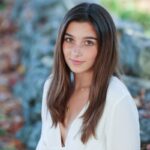 Fellowship Spotlight: Carli Romano on Shoreline Access in Rhode Island July 10, 2025 - As part of a CELS Summer Research Fellowship, marine affairs and political science double major Carli Romano is working with Professors Melva Treviño Peña and Jesse Reiblich on coastal access policy research in Rhode Island.
Fellowship Spotlight: Carli Romano on Shoreline Access in Rhode Island July 10, 2025 - As part of a CELS Summer Research Fellowship, marine affairs and political science double major Carli Romano is working with Professors Melva Treviño Peña and Jesse Reiblich on coastal access policy research in Rhode Island. 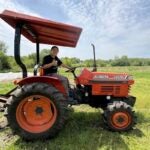 “Doing to Learn”: Fellowship Connects Students with Food System Work July 8, 2025 - From farming to research, students in the Rhode Island Agriculture and Food Systems Fellows Program offered through URI’s Cooperative Extension are spending their summers immersed in the local food system.
“Doing to Learn”: Fellowship Connects Students with Food System Work July 8, 2025 - From farming to research, students in the Rhode Island Agriculture and Food Systems Fellows Program offered through URI’s Cooperative Extension are spending their summers immersed in the local food system.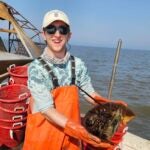 Nick O’Connor on Marine Science Research Experiences July 2, 2025 - Nick O’Connor, a marine biology and aquaculture and fisheries science double major, is participating in the NSF Research Experiences for Undergraduates program this summer at Rutgers University's Haskin Shellfish Research Laboratory. He is conducting research using camera-mounted fish traps to study fish distributions around artificial reefs off the Jersey shore.
Nick O’Connor on Marine Science Research Experiences July 2, 2025 - Nick O’Connor, a marine biology and aquaculture and fisheries science double major, is participating in the NSF Research Experiences for Undergraduates program this summer at Rutgers University's Haskin Shellfish Research Laboratory. He is conducting research using camera-mounted fish traps to study fish distributions around artificial reefs off the Jersey shore. 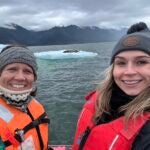 The leopard seal in focus June 27, 2025 - While leopard seals might be easily recognized for their ominous portrayals as villains in movies, they largely remain a mystery to humans. Professor Sarah Kienle and postdoctoral researcher Emily Sperou are working to fix that by contributing to our scientific understanding of these marine apex predators.
The leopard seal in focus June 27, 2025 - While leopard seals might be easily recognized for their ominous portrayals as villains in movies, they largely remain a mystery to humans. Professor Sarah Kienle and postdoctoral researcher Emily Sperou are working to fix that by contributing to our scientific understanding of these marine apex predators.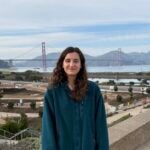 Applications of GIS: Meagan Shanaghan on the Development of URI Botanical Collections Database June 25, 2025 - At URI, GIS is used to manage the impressive botanical collections on the Kingston Campus. What started as a need for better organization of the accessions database – a spreadsheet that tracked the inventory of plants housed on campus – grew into an interactive tool used by both staff and visitors alike: URI Botanical Collections Database. The leading developer for the database was GIS and spatial services specialist Meagan Shanaghan ‘20 M.E.S.M. ‘23.
Applications of GIS: Meagan Shanaghan on the Development of URI Botanical Collections Database June 25, 2025 - At URI, GIS is used to manage the impressive botanical collections on the Kingston Campus. What started as a need for better organization of the accessions database – a spreadsheet that tracked the inventory of plants housed on campus – grew into an interactive tool used by both staff and visitors alike: URI Botanical Collections Database. The leading developer for the database was GIS and spatial services specialist Meagan Shanaghan ‘20 M.E.S.M. ‘23.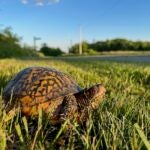 Leave no trace: Careful social media sharing can help protect local reptiles and amphibians June 24, 2025 - Compared to other New England states, there is less turtle density in Rhode Island due to the state’s urbanization. However, careful driving, and media use, are still recommended to help protect turtles and other vulnerable reptile and amphibian species.
Leave no trace: Careful social media sharing can help protect local reptiles and amphibians June 24, 2025 - Compared to other New England states, there is less turtle density in Rhode Island due to the state’s urbanization. However, careful driving, and media use, are still recommended to help protect turtles and other vulnerable reptile and amphibian species.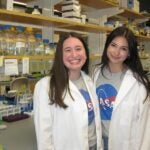 Taking curiosity to new heights: URI Ph.D. students awarded NASA fellowship June 24, 2025 -
Two Ph.D. students in the College of the Environment and Life Sciences’ interdisciplinary biological and environmental sciences graduate program have been awarded graduate research fellowships from the NASA Rhode Island Space Grant Consortium. Michelle Marder and Kate Remy ’24 are specializing in cell and molecular biology and aim to help scientists better understand antibiotic resistance.
Taking curiosity to new heights: URI Ph.D. students awarded NASA fellowship June 24, 2025 -
Two Ph.D. students in the College of the Environment and Life Sciences’ interdisciplinary biological and environmental sciences graduate program have been awarded graduate research fellowships from the NASA Rhode Island Space Grant Consortium. Michelle Marder and Kate Remy ’24 are specializing in cell and molecular biology and aim to help scientists better understand antibiotic resistance. Safe well water? Test to be sure June 18, 2025 - To provide residents with information on private well water testing, treatment, and maintenance, water quality expert Alyson McCann with the University of Rhode Island’s Cooperative Extension Water Quality Program will hold a free program on Wednesday, July 9, from 6 to 7 p.m. at the Cross’ Mills Public Library, 4417 Old Post Road, in Charlestown.
Safe well water? Test to be sure June 18, 2025 - To provide residents with information on private well water testing, treatment, and maintenance, water quality expert Alyson McCann with the University of Rhode Island’s Cooperative Extension Water Quality Program will hold a free program on Wednesday, July 9, from 6 to 7 p.m. at the Cross’ Mills Public Library, 4417 Old Post Road, in Charlestown.
